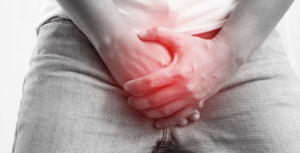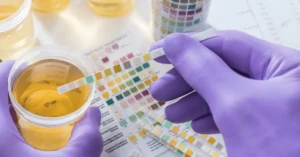Itchy genitals are one of the most common but most uncomfortable health issues we can face. The discomfort and embarrassing itching can cause anxiety and can also be very stressful, especially when at work or in public. Over time, the itching and scratching can cause inflammation, painful sex, increase the risk of infections and other complications.
Itching can be caused by a wide range of causes so we recommend seeing a GP for a proper assessment. You can book in with us by calling or booking online.
Common Causes of Itchy Genitals
Infections
- Yeast Infections: A common cause of genital itching in women, yeast infections are caused by an overgrowth of Candida, a type of fungus. Symptoms often include intense itching, redness, swelling, and a thick, white discharge resembling cottage cheese. This is commonly known as “thrush” and can affect you regardless of age or gender. It can also be passed back and forth between partners.
- Bacterial Vaginosis: This condition occurs when there is an imbalance of bacteria in the vagina. It can lead to itching, a fishy odour, and a greyish discharge. Women with bacterial vaginosis may experience itching and irritation.
- Sexually Transmitted Infections (STIs): Infections like chlamydia, gonorrhoea, and herpes can cause genital itching. Symptoms may vary but often include itching, discomfort, unusual discharge, and sores.
Skin Conditions
- Contact Dermatitis: This is an allergic reaction to substances that come into contact with the skin, such as soaps, lotions, or laundry detergents. Symptoms can include redness, itching, and rash in the affected area.
- Psoriasis: This chronic skin condition can affect any part of the body, including the genital area. It leads to red, scaly patches that can be itchy and uncomfortable.
- Eczema: Also known as atopic dermatitis, eczema can also occur in the genital region, leading to dry, itchy, and inflamed skin.
Poor Hygiene
Inadequate cleaning of the genital area can lead to the build-up of sweat, bacteria, and dead skin cells, which can cause itching. Conversely, over-washing, especially with harsh soaps, can strip the skin of its natural oils, resulting in dryness and irritation.
Hormonal Changes
Hormonal fluctuations, particularly during menstruation, pregnancy, or menopause, can lead to changes in the vaginal environment, increasing the likelihood of itching. Low oestrogen levels during menopause can cause vaginal dryness, leading to irritation and discomfort.
Pubic Lice & Scabies
Infestations of parasites such as pubic lice (often referred to as crabs) or scabies can cause intense itching in the genital area. These conditions are typically transmitted through close contact and can lead to significant discomfort.
Intertrigo
This condition occurs when skin rubs against skin, leading to inflammation and irritation. In the genital area, it can be exacerbated by moisture and lack of airflow, leading to itching and discomfort.
Systemic Conditions
Certain systemic conditions, such as diabetes or liver disease, can lead to itching in various parts of the body, including the genitals. Diabetic patients may experience thrush (a yeast infection), while liver disease can affect skin health and lead to itching.
Testing for Itchy Genitals
If you’re experiencing persistent genital itching, it’s essential to consult a GP for a proper evaluation. A GP will conduct a thorough physical examination of your genital area and your skin if the condition appears elsewhere, conduct swab tests and urine tests to exclude infections and may consider blood tests if the cause could be systemic or a blood-tested STI.
Physical Examination: A thorough examination of the genital area will help the provider identify any visible signs of infection or skin conditions.
Treatments for Itchy Genitals
Treatment for itchy genitals will depend on the underlying cause. Here are some common treatment options:
- Antifungal Treatments: For yeast infections, over-the-counter antifungal creams or prescription medications can effectively eliminate the infection. Common treatments include clotrimazole and fluconazole.
- Antibiotics: If bacterial vaginosis or a sexually transmitted infection is diagnosed, antibiotics may be prescribed. It’s crucial to complete the full course of medication as directed by your GP.
- Topical Steroids: For skin conditions like eczema or psoriasis, topical corticosteroids may reduce inflammation and itching. These should only be used under a GP’s guidance.
- Antihistamines: Antihistamines can be helpful in managing itching caused by allergic reactions, such as contact dermatitis. These medications can reduce the body’s histamine response, providing relief from itching and discomfort. Over-the-counter options like diphenhydramine may be effective, but they can also cause drowsiness, so it’s essential to follow the recommended dosage and be cautious about activities that require alertness.
- Moisturizers: For conditions resulting from dry skin, using a gentle, fragrance-free moisturizer can help soothe irritation. Regularly applying a moisturizer to the genital area can prevent dryness and maintain skin health.
- Hormonal Treatments: For women experiencing itching related to hormonal changes, such as menopause, vaginal oestrogen therapy may be recommended. This can help restore moisture to the vaginal area and alleviate dryness and itching.
- Hygiene Practices: Improving hygiene practices can also help alleviate itching. It’s important to gently wash the genital area with mild, unscented soap and water. Avoiding harsh soaps, scented products, and irritants is crucial. Keeping the area dry and wearing breathable cotton underwear can minimize moisture buildup, reducing the risk of infections and irritation. If you work out, change out of your workout gear as soon as possible and have a shower. Always dry the area thoroughly and avoid wearing damp underwear or bottoms.
When to Seek Medical Attention
It’s vital to seek medical attention if you experience any of the following symptoms:
- Persistent or severe itching that interferes with daily activities or sleep.
- Unusual or foul-smelling discharge.
- Redness, swelling, or sores in the genital area.
- Bleeding or pain during urination or sexual intercourse.
- Symptoms that do not improve with over-the-counter treatments.
We know that having itchy genitals, regardless of how they’ve come about, can affect your quality of life and cause enormous stress and discomfort. You may have already tried your GP and are experiencing a recurring issue. Take advantage of the benefits of a private GP service to help you reclaim your comfort and wellbeing. Book online or call us today.

















